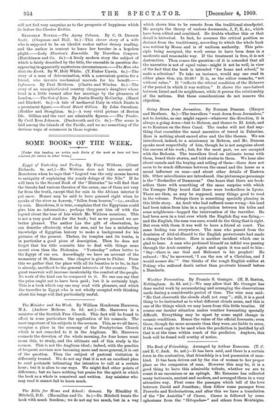Going Down from Jerusalem. By Norman Duncan. (Harper and Brothers.
6s.)—The travellers "went down from Jerusalem," not to Jericho, as one might expect—whatever the direction, it is always a going down—but to Hebron, and thence to El Arish, and so to Kantara on the Suez Canal. The reader will not find any- thing that resembles the usual narrative of travel in Palestine. Here is nothing about sacred sites and the like themes. We are introduced, indeed, to a missionary in Hebron, and Mr. Duncan speaks most respectfully of him, though he is not sanguine about the success of his work ; but, for the most part, we are occupied with the Bedouin. The travellers lived on intimate terms with them, heard their stories, and told stories to them. We hear also about camels and the buying and selling of them—there does not seem to be much difference between the camel and the horse as a moral influence on man—and about other details of Eastern life. Other miscellanies are introduced. One picturesque personage is the " Bookseller of Damascus." One hears that there are book- sellers there with something of the same surprise with which the Younger Pliny heard that there were booksellers in Lyons. There are then, as may be supposed, many things good to read in the volume. Perhaps there is something specially pleasing in this little story. An Arab who had suffered some wrong—his land had been taken from him in a negotiation between his tribe and some neighbours—begged the intervention of the traveller. He had been seen in a tent over which the English flag was flying,— and the English, the man was sure, would do the thing that is right. But even with them it was well to have a friend at court. The same feeling was everywhere. The man who passed from the dominion of Abd-ul-Hamid to the English protectorate had made a change for the better. Here is another incident which one is glad to hear. A man who professed himself an infidel was passing through the Arab country. Again and again it was said to him : "Say—there is one God and Mahomet is his prophet! He refused: No,' he answered, "I am the son of a Christian, and I would sooner die.' " One thinks of the rough English soldier at Peking who suffered death rather than prostrate himself before a Mandarin.






































































 Previous page
Previous page